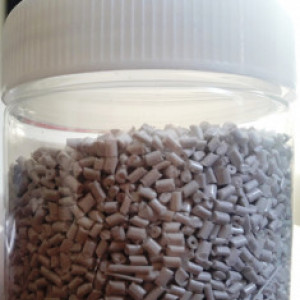| Taban Andish Berjis |

| No Title | 0.01 MB |
| Registration Date | 9 Jun 2019 |
| Revision Date | 9 Jun 2019 |
| Share |
Food Packaging
MasterbatchThis product is known as a PE-based masterbatch containing ZnO nanoparticles. It includes 16.23 Wt. % of ZnO. In nano-scale, ZnO particles produce the reactive oxygen species more than ZnO bulk and so higher antibacterial activity appears in ZnO nanoparticles. It shows high antibacterial activity according to INSO 10900 (Measurement of antibacterial activity on plastics and other non-porous surfaces). The following table clarifies how powerful it is against E.Coli and S.aureus bacteria. Antibacterial activity is defined as the ability of a material to eliminate the bacterial contacting with that. It is calculated by comparison of the logarithm of the number of the bacteria in the control sample and in the corresponding sample of that material.
Industrial and consumer polymers can be susceptible to microbial attack, causing undesirable effects such as staining, odors, and physical degradation. Bacteria and fungi feed on most plastic and polymer additives often leading to a potential loss of product integrity. Antimicrobial plastic, polymers and composites provide excellent benefits. Antimicrobial additives (masterbatches) offer valuable protection for polymers. They are incorporated into a wide variety of plastics and polymeric materials to prolong their life, maintain their aesthetic appeal, or reduce surface contamination. Polyester is a synthetic polymer with 18% market share of all produced plastic materials which is used extensively in clothing. Nanoparticles of ZnO are being used industrially for modifications of plastics. A common feature is their antibacterial activity. The antibacterial activity of them has been demonstrated against human pathogenic bacteria, mainly E.Coli and S.aureus.